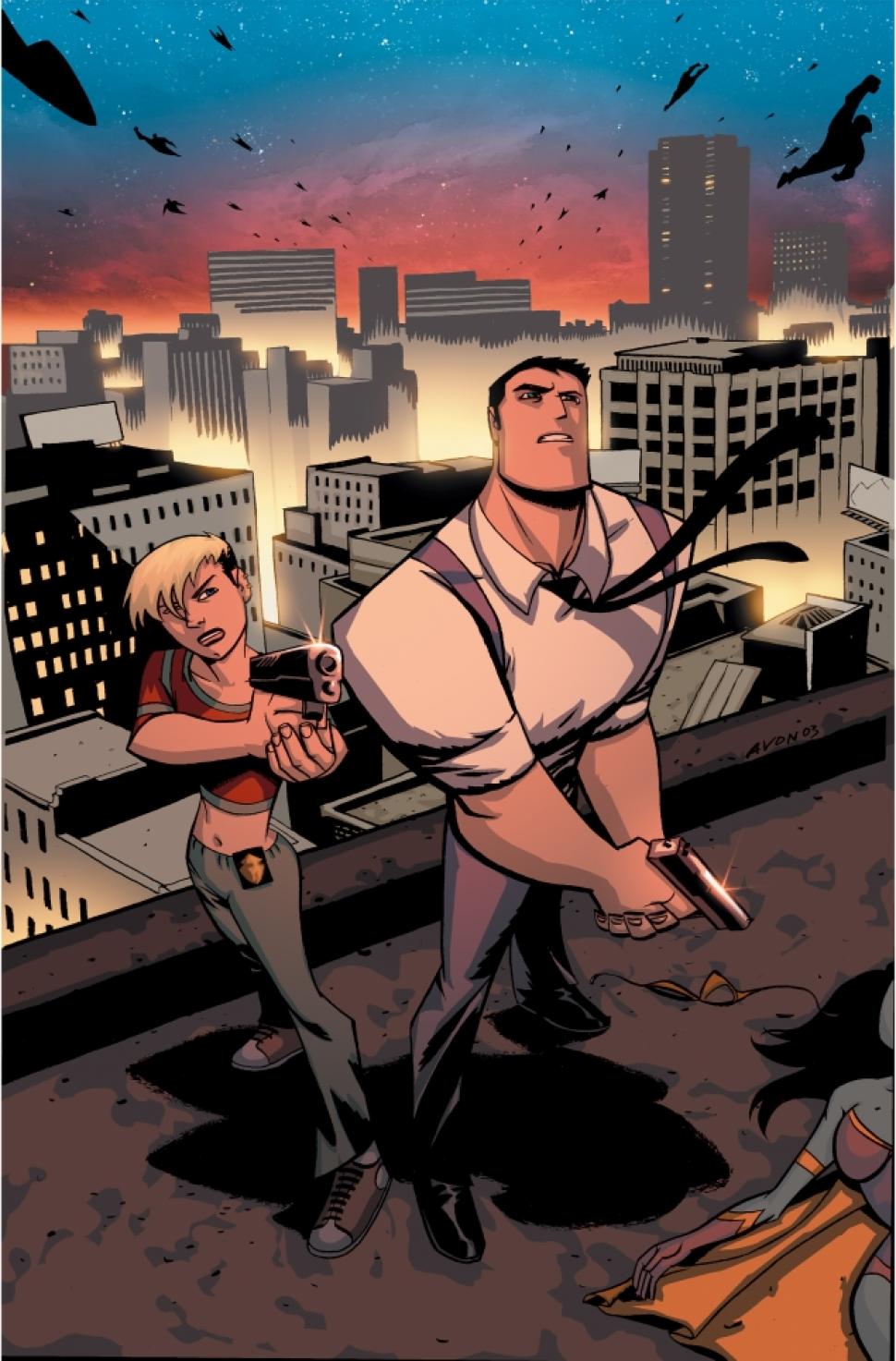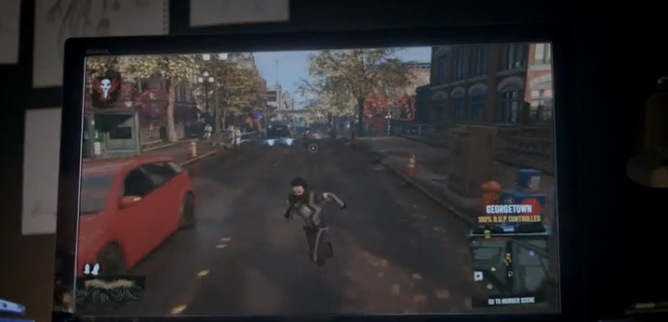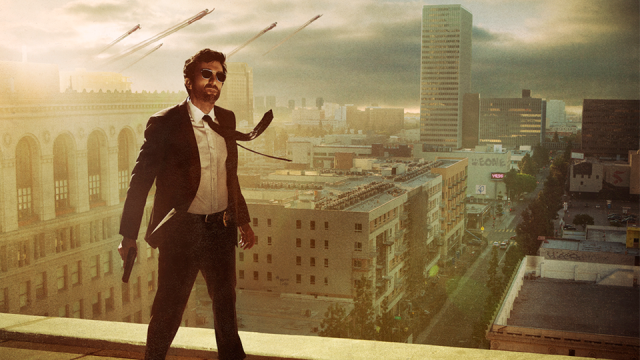“Y’know, back when I was what I was… this girl, one time after she blew me, she flew. Hovered, really. It happens sometimes with an exchange of fluids…” That’s a superhero-turned-cop in Powers explaining what happens after he hooked up with a non-super-powered person. Smallville, this ain’t.
Premiering today on PlayStation Network, Powers is adapted from the long-running police procedural/superhero comic from Brian Michael Bendis and Michael Avon Oeming. In the comic, the main characters are Christian Walker and Deena Pilgrim, detective partners who work in a law enforcement division tasked with solving metahuman-related crimes. Walker is more stoic and internalized whereas Pilgrim constantly spits acid-laced sarcasm. The crucial dynamic isn’t changed much in the TV series but, after watching the first three hours of Powers, I can say that a lot of other stuff gets significant tweaks.
Warning: mild spoilers follow for plot points of the Powers comics series.
The first episode of Powers sees Walker’s longtime partner killed by a rogue superdude who’s been arrested for using his special abilities in public, which is illegal in this show’s alt-Los Angeles. Deena Pilgrim, a less-experienced transfer from a smaller precinct, replaces the dead cop. The uneasy partners soon enter into an investigation of the death of a beloved hero. Of course, nothing is what it seems.
Like dozens of comics concepts ever since Watchmen came out, Powers tries to explore how the existence of superheroes would change society in a world like our own. Normal humans would probably adore, hate or lust after them. But it’s a specific take on how cops would likely interact with mask-wearing vigilantes that’s won Powers its longevity and fan base since 2000. Police officers might alternately hate and need superpowered people if they existed, and the first three episodes of Powers delve into what that relationship would look like.
In the comics, Walker’s status as a former masked hero was a secret for much of the early run. Here, the fact that he used to be a high-flying hero called Diamond is divulged in the first five minutes of the first episode. It is portrayed as a matter of public record. It’s a welcome change that lets the show’s writers bring his barely-sublimated rage and envy to the fore. This is a guy who hasn’t really gotten over the fact that he can’t fly anymore.
It’s weird seeing Sharlto Copley do a growly alpha-male performance as Walker. I’m mostly used to seeing him as a quirky beta dude. But there are moments when the gruffness recedes and well-executed reactions of sadness and regret poke through. The shift in expressions when Walker delivers the remnants of his dead partner’s desk to his family communicates palpable sadness.
The first three episodes pump out intermittent teases about Walker’s time as a member of a loose-knit crew of Powers. Olympia, the deceased superhero whose death he’s investigating? He’s an old, married friend who winds up dead following a one-night stand. As more and more of Walker’s past starts to resurface, Copley’s performance gets more and more human. Walker’s exalted status as a former Power rubs Pilgrim the wrong way — especially when he schmoozes his way into someone’s confidence — but it also lets him work angles during criminal investigations that other cops can’t. Nevertheless, that special insight doesn’t stop him from being haunted by what he once was.

While the cop-show police procedural elements feel overly familiar — the locker-room vibe of the squad room, the put-upon commanding officer and underfunded-yet-sorely-needed unit — the interpretations of superhero tropes come off as a bit fresher. Intertwining cape-comics plot beats with the zeitgeist of celebrity obsession lets the show explore the dark underbelly of what it means to be famous. So you get dialogue about young powers-having kids aimlessly hanging out and chasing their fleeting hit of internet fame. Despite the superhero-as-boldfaced-name theme, a gory, hard-news segment on celeb-fluff gossip show Extra after a metahuman kills a cop feels like a bridge too far. C’mon, no amount of disbelief suspension is letting a decision like that slide. It may be shorthand for how superheroes are like movie stars, but it’s a really clumsy one.
There are better ways to hit at that subtext, after all. “Why change when everyone loves you the way you are?,” a civilian character says, when reflecting on the psychology of stunted maturity common amongst Powers who become superstars. It riffs off of what we see in real-world celebrities, sure, but that line could also be interpreted as a bit of meta-commentary on superhero comics and movies themselves. The vast majority of the costumed crimefighter genre is still stuck in adolescent power fantasy mode, and little of the narratives that spring from that space feel like grown-up considerations of the adolescent part of that formula.
It’s probably no surprise that Sony’s trying to infuse corporate synergy into its first PlayStation exclusive TV show. Sony Vaio computers are everywhere, for example, and iPhones apparently don’t exist in this alternate universe either. In the second episode, a kid is playing a version of Infamous: Second Son re-skinned to star Diamond. And, of course, he’s wearing a fancy Sony gaming headset to voice chat with his friend. Does any of it break Powers’ appeal? No, but it does seem like heavy-handed marketing in a show that’s trying for a naturalistic approach to the fantastic.

Thankfully, the cast’s performances in Powers are strong enough to not be undercut by hamfisted marketing. Susan Heyward brings a nice mix of toughness and vulnerability to her portrayal of Deena Pilgrim. She wants Walker’s approval but isn’t afraid to call him out. Again, it’s not quite what the character is in the comics — where she’s a lot more seasoned and less of a cop-show-cliche rookie — but it works as a re-imagination. Noah Taylor does a great turn as the teleporting Johnny Royale, too, infusing the central bad guy of these early Powers eps with a creepy charisma shot through with just enough humanity to make him sympathetic.
Powers comics readers might get whiplash at all that’s changed. Walker and Royale are former friends here, coming to the big city as teenagers trying to make the big time, which is a bit of a garage-band to rockstar metaphor. And where the feral Wolfe was more of an aloof, enigmatic villain in the comics, he was the young duo’s mentor on the show, one who Walker later has to take out. Wolfe. Characters’ relationships are all more tightly bound in the TV adaptation and it leans on coincidence much more the source material ever did. The plot-device shifts make sense, though, given differences in each medium’s storytelling tools and the results make the TV version of Powers feels more immediately accessible with regard to its characters emotions.
Even though the use of violence and sex in the first three episodes comes close to feeling egregious, there’s enough thematic skill and performative charm in the first three hours of Powers to make me want to watch more of the series. It’s different than the comics it’s based off but, right now, Powers looks like it might be just as good.

Comments
15 responses to “PlayStation’s First TV Show Delivers Really Screwed-Up Superheroes”
Can’t watch the video in this country. Should have checked that if the article is going on the Australian Kotaku site.
Strangely the video seems to be impossible to view everywhere.
Oh man, I do like Sharlto “The sweety man” Copley. Got Eddie Izzard in it too
You also get to see Eddie’s wang in all its glory for some reason. Not that I’m into that kind of thing. And not that there’s anything with being into that sort of thing either.
This looks like utter shite.. This is one of the comics where all they had to do is follow the comics and it would have been awesome.
Awww I was excited to think that it was going to be available here, way to get my hopes up Kotaku.
Is the show coming to PSN in Australia at all?
Why is PlayStation making TV programs at all?
The company that makes Playstation make a whole range of things.
Perhaps you’ve heard of them before…
Potentially inflammatory and completely unnecessary sarcasm aside, it makes sense (at least from a business point of view) that Sony would try and flog a few of their TV shows on PSN in the hopes of selling a few more consoles.
The whole television angle was something that was distinct from Xbox One’s TV TV TV Call of Duty Sports TV TV launch.
If I recall correctly, even Xbox gave up on producing so much TV.
So why is a corporation that has had troubling finances recently invest in TV?
I wasn’t trying to cause offense there, merely pointing out that Sony have a long history of making a lot more than just video games, particularly when it comes forms of entertainment such as music and movies. TV actually seems a likely and natural progression. For Microsoft it was always going to be a larger gamble because they (to the best of my knowledge) have little to no experience with producing entertainment outside of games.
Well to be fair, Sony’s financial troubles are the result of their mobile/telecom divisions and extremely low TV sales. The PlayStation and other production divisions have been profitable, so it makes sense for them to invest in those areas.
I can’t believe that we can’t even get this in Australia!! Then companies wonder why Australians download so much!
It has Sharlto, it must be watched.
Might be good to know when it comes out in AU & if it will get the same deal as in the US Playstation Store.
In the US store the first episode is free but if you are a Playstation Plus member the first season is also free.